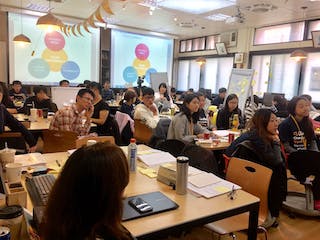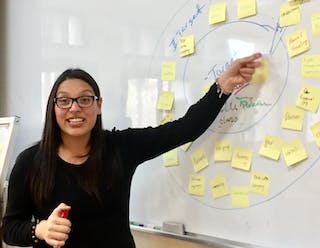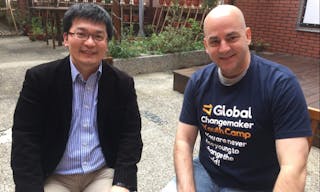What you need to know
'I’ve seen many Taiwanese social businesses trying very hard and are doing a good job, but the international community doesn’t see their efforts.'
“I think many social businesses in Taiwan think that if they share a portion of their profit to the general public then they are a social business. But they are not. The mission of these companies should be related to social problems and all profit should be reinvested.”
Professor Shen Chien-wen (沈建文) says this with a firm and serious tone. He has been teaching at the Department of Business Administration at National Central University (NCU) since 2009, and is also director of the Yunus Social Business Centre (YSBC) at NCU.
The YSBC at NCU was established in 2014 when Nobel laureate Professor Muhammad Yunus visited Taiwan and signed a memorandum of understanding between the Yunus Centre in Bangladesh and NCU. Yunus, a Bangladeshi social entrepreneur, was awarded the Nobel Peace Prize in 2006 for founding the Grameen Bank which makes small loans to impoverished people without requiring collateral — known as microcredit.
With the intention to inspire and support youths in building social businesses under the Yunus business model, YSBC has held many events in the last three years, but Shen believes “many Taiwanese students want to attend these events to write some business proposals to enter competitions.”
“They simply want to have a good record on their resumes,” Shen told The News Lens. “Most of them aren’t that enthusiastic about really establishing a social business.”
He believes that the mindset and attitude for social business entrepreneurship is important, and the experiences of successful global social business entrepreneurs can inspire and motivate young Taiwanese to start thinking about doing the same.
This is the concept behind the first Global Changemaker Youth Camp held by YSBC and USBCT, a Taipei-based business management consultancy.
The four-day event, held from Jan. 15 to Jan. 18, flew in eight social business entrepreneurs from around the world to share their experiences with a group of 45 Taiwanese aged 17 to 30.
“I think it’s really important for them [young Taiwanese] to meet people who have done it and are still doing it to see that it’s an option and there is a market for it. It’s a different mindset,” says David A. Hall, founder of USBCT. “It’s about inspiring youths; to let them see that it’s cool, you can make money, you can have a good living.”

Photo Credit: Olivia Yang/The News Lens
Government support
According to the Taiwan NPO Self-Regulation Alliance (台灣公益團體自律聯盟), there are currently around 140 social businesses in Taiwan, “but many of them are not company-based and are instead NPOs (nonprofit organizations),” says Shen.
To promote sustainable innovation and growth, and encourage young people to engage in social enterprises, the Executive Yuan in 2014 launched a three-year Social Enterprise Action Plan and was considering amending the Company Law to have a special chapter for social businesses.
However, many said it was unnecessary, so the government is currently waiting until social businesses have their own ecosystem to draft laws regulating them, says Shen.
He says this shows the government has the resources to invest in potential social businesses and are advocating for them, but aside from providing financial support, Shen believes it can create projects for social businesses to bid for to give them more opportunities.
“But it’s not just about the lowest bid, but which plan offers the most sustainable solution and social impact,” says Shen.
Hall echoes Shen in saying the government can do more to help social businesses in Taiwan, especially in ending the stigma surrounding these businesses.
“They can be the cheerleader and the visionary in communicating with people that this is important,” says Hall. “The government can show through its actions that it is involved in social businesses. Be the mouthpiece for these businesses.”

Photo Credit: Olivia Yang/The News Lens
Looking outwards among growing global demand
Shen and Hall believe social businesses in Taiwan are currently still at the early stage, and many local social entrepreneurs “think too local.”
“I’ve seen many Taiwanese social businesses trying very hard and are doing a good job, but the international community doesn’t see their efforts,” says Shen. ”It’s important for the young generation to make not just a local impact, but also a global impact. Let people know what you are doing and you can get more opportunities to find resources.”
The pair says there is a growing demand around the world for social businesses, and increasing numbers of young people are looking to contribute to something that is bigger than themselves.
“Millennials are demanding corporate social responsibility, so big companies are now seeing there is a big demand there,” says Hall. “There is a lot of potential with this generation.”
Dr. Asher Hasan is founder and CEO of Naya Jeevan, a social enterprise providing low-income families in emerging economies with affordable access to healthcare. Hasan was one of the eight speakers invited to speak at the Global Changemaker Youth Camp.
“I think that social entrepreneurs need to be hugely resilient, but beyond that they need to be really outwardly looking and looking to connect the unconnected,” says Hasan. “There are lots of people that don’t have linkages or connections to markets or opportunities, but that’s where opportunities lie.”
Shen and Hall believe social businesses should still be human-centric and there is the need to start thinking about new businesses models that can not be replaced by robots or artificial intelligence.
“Humans are even more important in the age of technology,” says Hall.
“I’m really looking forward to seeing the students take action. It’s not just about planning, but the students really have to want to do something and make an impact. That’s the spirit of this event,” says Shen. “I anticipate seeing more ‘real’ social businesses.”
Editor: Edward White



